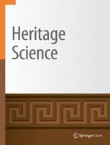Heritage Science is an open access journal publishing original peer-reviewed research covering:
- Understanding of the manufacturing processes, provenances, and environmental contexts of material types, objects, and buildings, of cultural significance including their historical significance.
- Understanding and prediction of physico-chemical and biological degradation processes of cultural artifacts, including climate change, and predictive heritage studies.
- Development and application of analytical and imaging methods or equipment for non-invasive, non-destructive or portable analysis of artwork and objects of cultural significance to identify component materials, degradation products and deterioration markers.
- Development and application of invasive and destructive methods for understanding the provenance of objects of cultural significance.
- Development and critical assessment of treatment materials and conservation of artwork and objects of cultural significance.
- Development and application of statistical methods and algorithms for data analysis to further understanding of culturally significant objects.
- Development of computational methods such as machine learning, 3D visualization and geographical information systems for the understanding and modelling of cultural objects.
- Description of novel technologies that can assist in the understanding of cultural heritage.
- Applications from social sciences and humanities, such as linguistics, musicology and geography, which include substantial computational, statistical or analytical content and are relevant to heritage studies.
- Applications of archeometry where quantitative and instrumental methods are used for the study of human civilization.
- Applications of geological and geochemical investigations relevant to human history.
Submissions must be of international rather than localized interest. All papers should demonstrate this in their background discussions and bibliography.
Submissions from cultures or regions that are less well-studied using modern scientific methods will be considered, even if the methods used are better established elsewhere, providing the work is technically sound and placed into international context.
Papers involving conservation science should report new methods or novel assessments of existing approaches that have general international interest. Alternatively, if using well-established approaches, these should be applied to objects or groups of objects that are of wide interest and have not commonly been previously conserved using the approaches reported.
